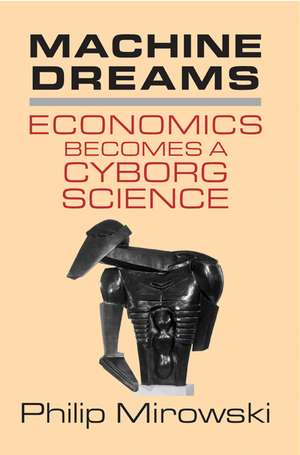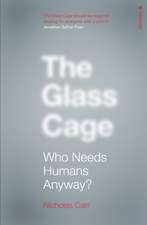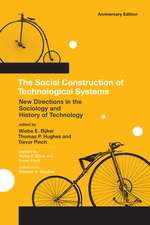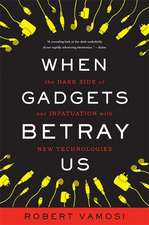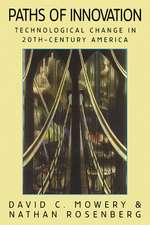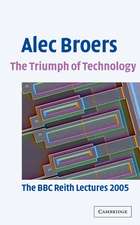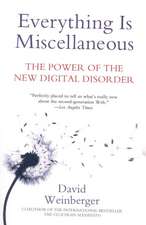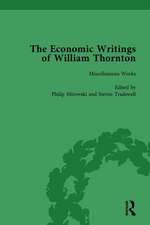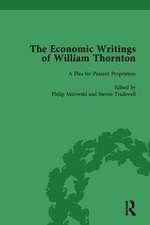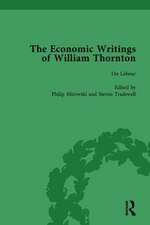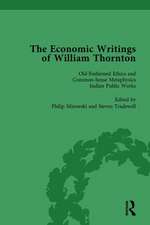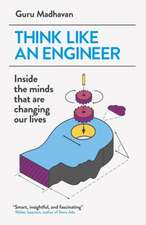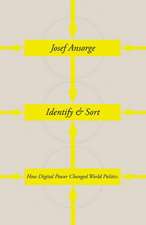Machine Dreams: Economics Becomes a Cyborg Science
Autor Philip Mirowskien Limba Engleză Paperback – 2 dec 2001
| Toate formatele și edițiile | Preț | Express |
|---|---|---|
| Paperback (1) | 488.68 lei 6-8 săpt. | |
| Cambridge University Press – 2 dec 2001 | 488.68 lei 6-8 săpt. | |
| Hardback (1) | 1098.21 lei 6-8 săpt. | |
| Cambridge University Press – 2 dec 2001 | 1098.21 lei 6-8 săpt. |
Preț: 488.68 lei
Preț vechi: 549.08 lei
-11% Nou
Puncte Express: 733
Preț estimativ în valută:
93.52€ • 97.28$ • 77.21£
93.52€ • 97.28$ • 77.21£
Carte tipărită la comandă
Livrare economică 15-29 aprilie
Preluare comenzi: 021 569.72.76
Specificații
ISBN-13: 9780521775267
ISBN-10: 0521775264
Pagini: 672
Ilustrații: 5 b/w illus. 3 tables
Dimensiuni: 155 x 229 x 40 mm
Greutate: 0.99 kg
Ediția:New.
Editura: Cambridge University Press
Colecția Cambridge University Press
Locul publicării:New York, United States
ISBN-10: 0521775264
Pagini: 672
Ilustrații: 5 b/w illus. 3 tables
Dimensiuni: 155 x 229 x 40 mm
Greutate: 0.99 kg
Ediția:New.
Editura: Cambridge University Press
Colecția Cambridge University Press
Locul publicării:New York, United States
Cuprins
Acknowledgements; 1. Cyborg agonistes; 2. Some cyborg genealogies; or, how the demon got its bots; 3. John von Neumann and the cyborg incursion into economics; 4. The military, the scientists and the revised rules of the game; 5. Do cyborgs dream of efficient markets?; 6. The empire strikes back; 7. Core wars; 8. Machines who think versus machines that sell; Envoi; References; Index.
Recenzii
'In Machine Dreams the most exciting historian of economic thought of our time takes on one of the most fascinating themes of the intellectual history of the twentieth century - the dream of creating machines that can think and how this has affected the social sciences. The result is an extraordinary book that deserves to be read by everyone interested in the social sciences.' Richard Swedberg, University of Stockholm
'Phil Mirowski reminds me of an investigative reporter with a world-class story. He has gone straight to the heart of a really interesting problem - the emergence of economics' modern era in the crucible of World War II - and come back with a detailed account of events at The Cowles Commission and the RAND Corporation. It is news, the best that can be said quickly. It is opinion: cyborg economics (meaning purely cognitive economics) is not the sort of science Mirowski wants to see. And it is sensationally interesting.' David Warsh, The Boston Globe
'Machine Dreams is an astonishing performance of synthetic scholarship. Mirowski traces the present day predicaments of economic theory to its intellectual reformulation and institutional restructuring by military funding and in the crucibles of World War II and the Cold War. His demonstration that the mathematical economics of the postwar era is a complex response to the challenges of 'cyborg' science, the attempt to unify the study of human beings and intelligent machines through John von Neumann's general theory of automata, is bound to be controversial. His critics, however, will have to content with a breathtakingly wide range of published and unpublished evidence in fields ranging from psychology to operations research he presents. This noir history of economic thought will change its readers' understanding of twentieth-century economics.' Duncan Foley, New School University
'… this is an important book that all economists who are genuinely interested in the future of their discipline should read.' The Times Higher Education Supplement
'… a remarkable achievement. It is hard to imagine a historian who was not an economist (as Mirowski is) being able to encompass the economics of the second half of the 20th century in its diversity and technicality.' London Review of Books
'Phil Mirowski reminds me of an investigative reporter with a world-class story. He has gone straight to the heart of a really interesting problem - the emergence of economics' modern era in the crucible of World War II - and come back with a detailed account of events at The Cowles Commission and the RAND Corporation. It is news, the best that can be said quickly. It is opinion: cyborg economics (meaning purely cognitive economics) is not the sort of science Mirowski wants to see. And it is sensationally interesting.' David Warsh, The Boston Globe
'Machine Dreams is an astonishing performance of synthetic scholarship. Mirowski traces the present day predicaments of economic theory to its intellectual reformulation and institutional restructuring by military funding and in the crucibles of World War II and the Cold War. His demonstration that the mathematical economics of the postwar era is a complex response to the challenges of 'cyborg' science, the attempt to unify the study of human beings and intelligent machines through John von Neumann's general theory of automata, is bound to be controversial. His critics, however, will have to content with a breathtakingly wide range of published and unpublished evidence in fields ranging from psychology to operations research he presents. This noir history of economic thought will change its readers' understanding of twentieth-century economics.' Duncan Foley, New School University
'… this is an important book that all economists who are genuinely interested in the future of their discipline should read.' The Times Higher Education Supplement
'… a remarkable achievement. It is hard to imagine a historian who was not an economist (as Mirowski is) being able to encompass the economics of the second half of the 20th century in its diversity and technicality.' London Review of Books
Descriere
Machine Dreams recounts how the computer has transformed the content of American economics.
